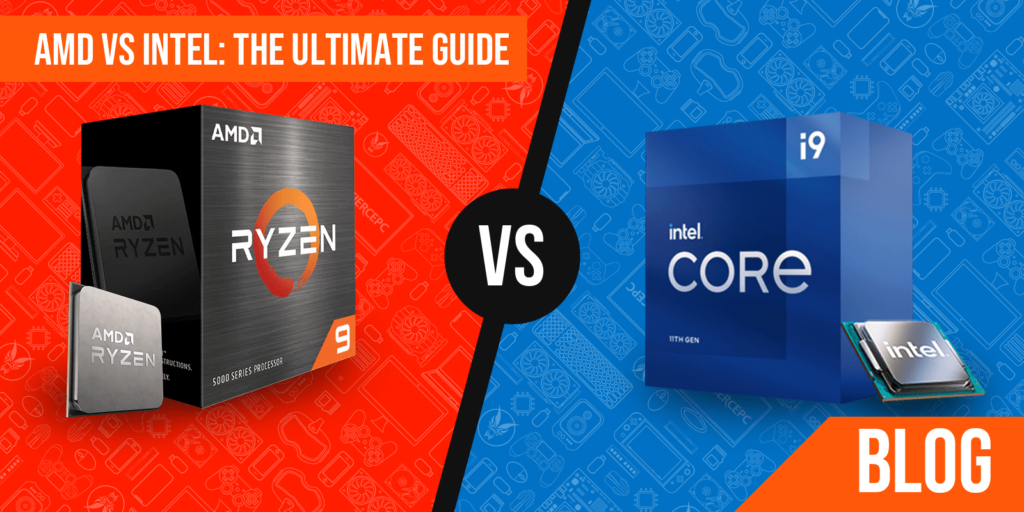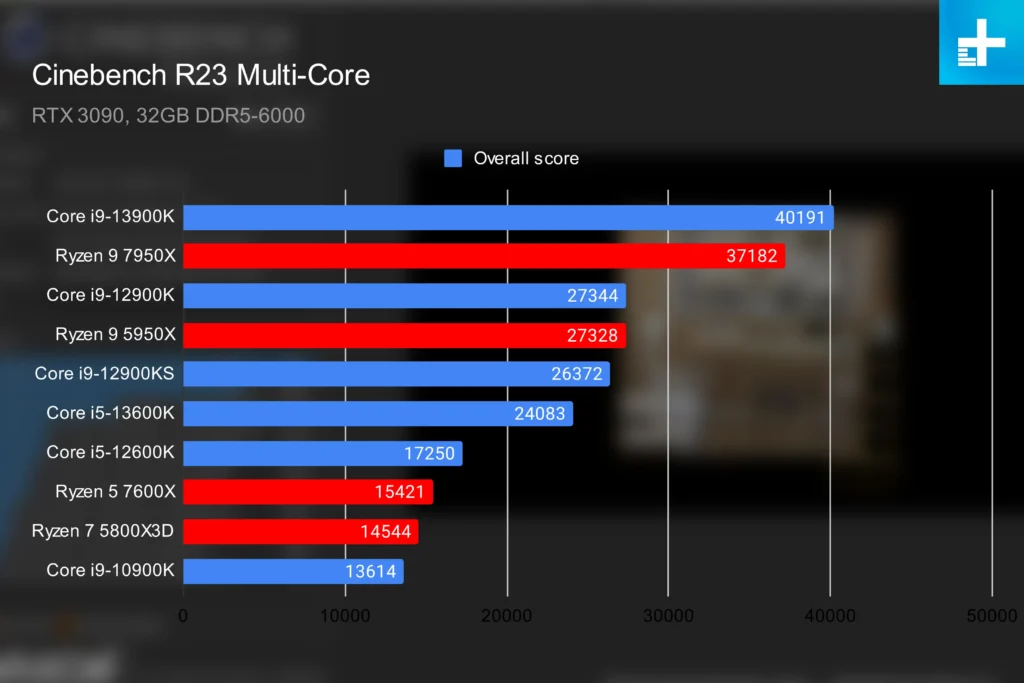Introduction
Choosing the right processor for your computer is crucial, whether you’re building a new PC or upgrading an old one. Two popular contenders in the mid-range market are the AMD Ryzen 5 and Intel Core i5 processors. The question on everyone’s mind is: is Ryzen 5 better than i5? Both processors offer impressive performance and value, but their strengths and weaknesses vary depending on your specific needs. In this post, we will delve into a detailed comparison, examining performance, price, power consumption, compatibility, and use case scenarios to help you determine which CPU is the better choice for you. So, let’s dive in and see which one is best

Performance Comparison
Ryzen 5 processors typically boast higher core counts, ranging from 6 to 16 cores depending on the generation. This translates to better multitasking capabilities, handling multiple demanding applications simultaneously. Intel’s i5 series usually offers 4 or 6 cores, prioritizing single-core performance for tasks like gaming and web browsing. However, newer i5 models like the 13500H boast hybrid architectures with additional efficiency CPU cores, enhancing their multitasking abilities.
Clock speed, measured in GHz, indicates the number of cycles a processor can execute per second. Both Ryzen 5 and i5 processors offer competitive clock speeds, ranging from 3.3 GHz to 5.5 GHz depending on the model and turbo boost capabilities. While higher clock speeds generally translate to faster performance, it’s not the sole factor. Modern processors also employ intelligent boosting and caching mechanisms, making direct comparisons based solely on clock speed less accurate.
Is Ryzen 5 Better Than i5: Latest processor performance
| Specification | AMD Ryzen 5 5600x | Intel Core i5-12600K |
| CPU Socket | AMD AM4 | LGA 1700 |
| Cores | 6 | 10 (6P + 4E) |
| Threads | 12 | 16 |
| Lithography | TSMC 7nm FinFET | Intel 7 (10nm) |
| Base Frequency | 3.7GHz | 3.7GHz (P-core) | 2.8GHz (E-core) |
| Boost Frequency | 4.6GHz | 4.9GHz (P-core) | 3.6GHz (E-core) |
| Unlocked for overclocking? | Yes | Yes |
| L3 Cache | 32MB | 20MB |
| Default TDP | 65W | 125W |
| Max. Operating Temperature (Tjmax) | 95°C | 100°C |
| Memory Support | DDR4 up to 3200MHzUp to 128GB | DDR4 3200MT/s | DDR5-4800MT/sUp to 128GB |
| Integrated Graphics | NA | UHD Graphics 770 |
Ryzen 5 vs Intel i5 : Platforms and Compatibility
Now that you have most of the technical information, another aspect to look out for is which CPU is future-proof. In terms of future-proofing, Intel is the best bet. Intel Core i5 supports DDR5 memory modules and PCIe 5.0, both of which are not supported by any of the AMD Ryzen chips in the market right now. But with all these features, the new Alder Lake Intel CPUs also come with a more premium price tag.
Another thing you should know is that the new Alder Lake CPUs are not supported by the existing motherboards in the market. For that, you must have an LGA 1700 CPU socket, which is available only on the new Z690 motherboards. Additionally, these motherboards are slightly expensive and increase the overall cost of your PC.

So, if you really want to experience the latest 12th-gen Intel Core i5 CPUs, you’ll definitely need to buy the new Z690 motherboard. Along with the new Z690 motherboard, you will also need to invest some more in those DDR5 modules, which will put a significant hole in your budget. Also, the best and most high-performing DDR5 RAM modules are expensive and rare in the current market.
On the other hand, if you decide to upgrade to an AMD Ryzen 5 series processor, it is not that expensive. The current Ryzen series 5 supports the existing motherboards with an AM4 socket, which is not that expensive. And talking about the DDR5 memory modules, which AMD clearly does not support, you don’t have to worry about them too much as the current DDR4 modules are sufficiently powerful enough, and there is still time for them to mature.
Furthermore, the PCIe 5.0 standard is less likely to become mainstream until more CPUs and peripherals are ready to support it. To conclude, Intel is clearly ahead in terms of some features, but it is still recommended that you consider AMD if you are looking for a complete value-for-money package.
Compatibility and Features
Processors are designed with specific sockets and are incompatible with various sockets. There are mechanical, keying, and electrical differences. Regarding the platform compatibility of both, the processors have entirely different chipsets. Intel core i5 processor uses Intel 300 Series chipset board which is again different from other versions from the same brand.
The AMD Ryzen 5 uses the AM4 platform. It is for tweakers and overclockers who seek the absolute best performance. The use of AMD x570 chipset, which is known for low-level and comprehensive control. The chipset supports dual graphics due to two PCIe 4.0 slots for graphics cards
Use Case Scenarios
Best Choice for Gaming
When it comes to gaming, both the Ryzen 5 and Core i5 processors offer excellent performance, but the best choice often depends on the specific games and resolutions you play. Intel’s Core i5, particularly the latest models, typically offers higher single-core performance, which is crucial for gaming. Games that rely heavily on single-threaded performance may run slightly better on a Core i5. However, AMD’s Ryzen 5 CPUs, with their superior multi-threaded performance and additional cores, are better suited for gaming while streaming or multitasking. If you play modern, multi-threaded games or plan to stream, the Ryzen 5 might edge out the i5 in overall experience.
Best Choice for Productivity and Multitasking
For productivity and multitasking, AMD Ryzen 5 processors often take the lead. With higher core counts and more threads, Ryzen 5 CPUs excel in tasks like video editing, 3D rendering, and running multiple applications simultaneously. Applications that can utilize multiple cores will see significant performance improvements with Ryzen 5. Intel’s Core i5, while capable, may lag behind in heavy multi-threaded workloads. Therefore, for users who need robust performance in professional applications and multitasking environments, the Ryzen 5 is usually the better choice.
Best Choice for Casual Use and Everyday Tasks
For everyday tasks such as web browsing, office work, and media consumption, both Ryzen 5 and Core i5 processors perform admirably. The performance difference in casual use is negligible, as both CPUs provide more than enough power for these activities. However, Intel’s integrated graphics can be an advantage for users who do not require a dedicated GPU, offering a slight edge for those seeking an all-in-one solution. That said, AMD’s integrated graphics in Ryzen APUs also perform well for everyday tasks, making either option suitable for casual users.
Recommendations for Different Types of Users
- Gamers: If your primary focus is gaming and you prefer titles optimized for single-thread performance, the Intel Core i5 might be your best bet. However, if you game and stream simultaneously or play games that leverage multiple cores, the AMD Ryzen 5 is likely a better choice.
- Professionals: For professionals engaged in content creation, programming, or any productivity tasks that benefit from multi-threading, the AMD Ryzen 5 stands out with its superior multi-core performance and efficiency.
- General Users: For general users who use their computers for a mix of tasks like browsing, streaming, and office work, both processors are more than adequate. Intel’s integrated graphics might offer a slight convenience, but either CPU will provide a smooth and efficient experience.
In summary, the choice between Ryzen 5 and Core i5 ultimately depends on your specific needs and use cases. Both processors have their strengths, and understanding your primary requirements will help you make the best decision
Conclusion
If you don’t mind the entry cost it needs to build a gaming PC with the Intel CPU then the Intel Core i5 CPU with the latest 12th chain chip is the no-brainer choice here. It will provide you with the best performance and will set you up for many more years to come it is best for gaming as well as content creation works also. The Intel Core i5 12600k is the best pick right now, and it completely dominates the Ryzen 5600X.
That being said, it does not mean that AMD Ryzen 5 5600X is by any means a bad CPU. It is a good combination of both power efficiency and a good thermal solution. It may not be as powerful as the 12600k from Intel. But it will provide you with a much better setup if heating is an issue for you. Also, if you want yourself to be future-proof, then you might want to stay away from AMD Ryen 5 as it does not support features like DDR5 and PCIe 5.0
Also Read:: Is Ryzen 5 Better Than i5? A Detailed Comparison